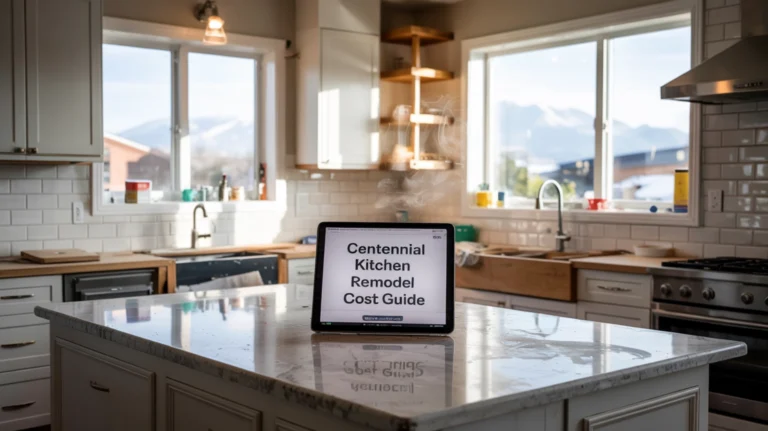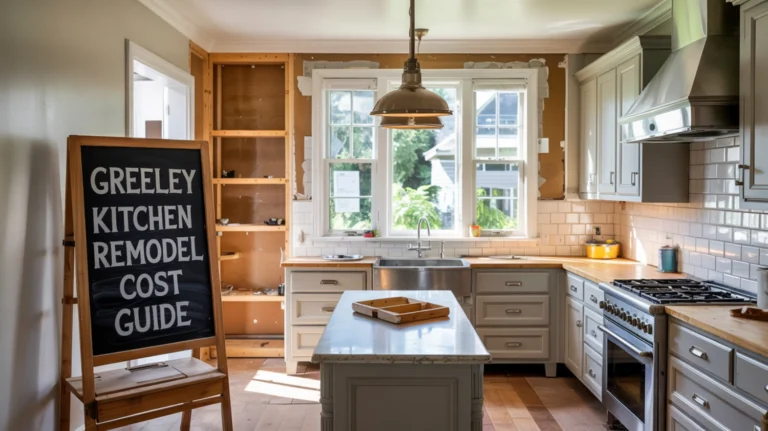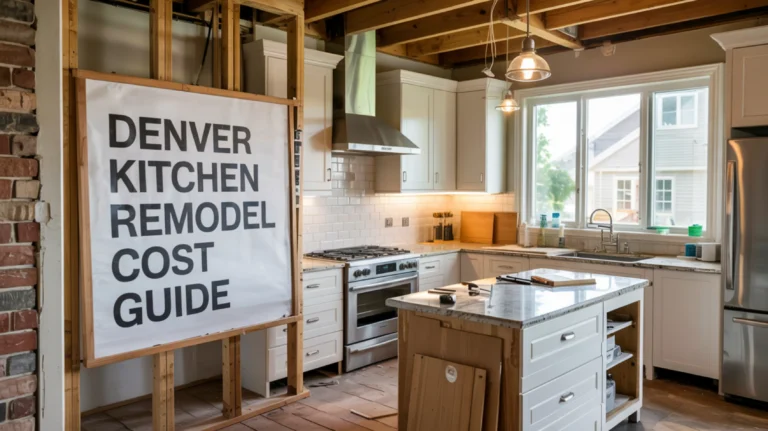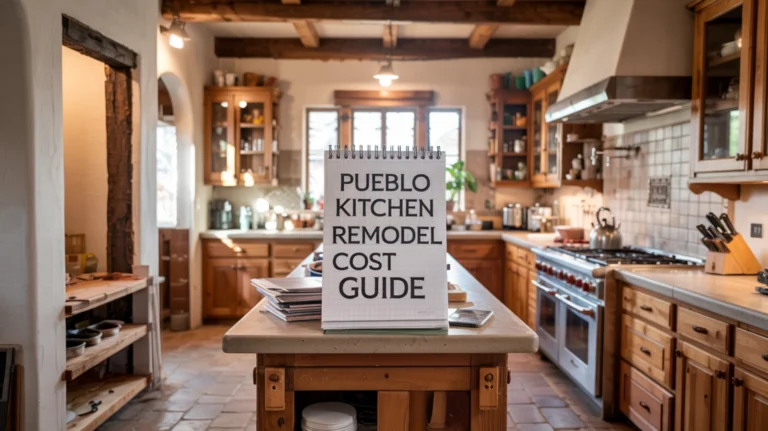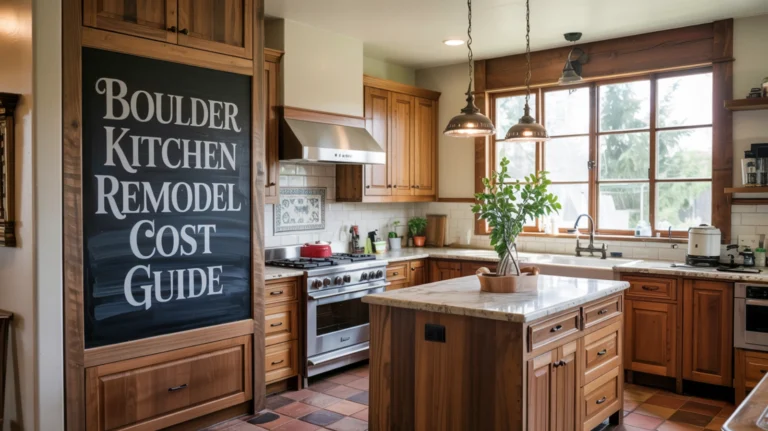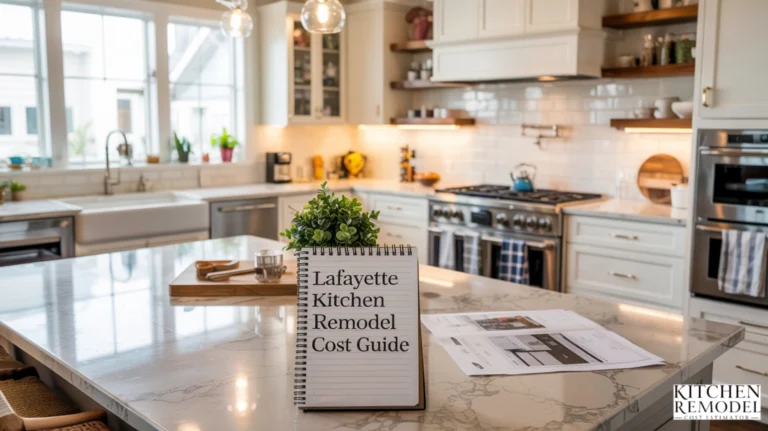Renovating a kitchen in Littleton isn’t just about picking pretty countertops and fancy appliances. It’s about navigating a complex web of material costs, ROI considerations, and local permitting requirements that can make or break your budget. Whether you’re eyeing a simple refresh or dreaming of a magazine-worthy transformation, understanding the Littleton-specific market matters.
So what’s the real price tag for turning your outdated kitchen into the heart of your Colorado home?
The average kitchen remodel cost in Littleton, Colorado ranges from $20,000 to $60,000. Basic remodels can start at $12,000, while high-end renovations with luxury features and custom design can surpass $85,000. Costs vary based on kitchen size, material quality, and local contractor pricing.
Kitchen Remodel Cost Estimator for Littleton
Thinking about updating your kitchen in Littleton, Colorado? You’re probably wondering about the price tag attached to your dream renovation.
Littleton Kitchen Remodel Cost Calculator
Get an estimate for your kitchen renovation based on your specifications.
Estimated Kitchen Remodel Cost
This estimate is based on national averages and may vary based on your location, material availability, contractor rates, and other factors. Prices are estimates only and should be used for planning purposes.
Looking for more accurate costs in your area? Search for location-specific remodel costs.
Overall Littleton Kitchen Remodel Costs
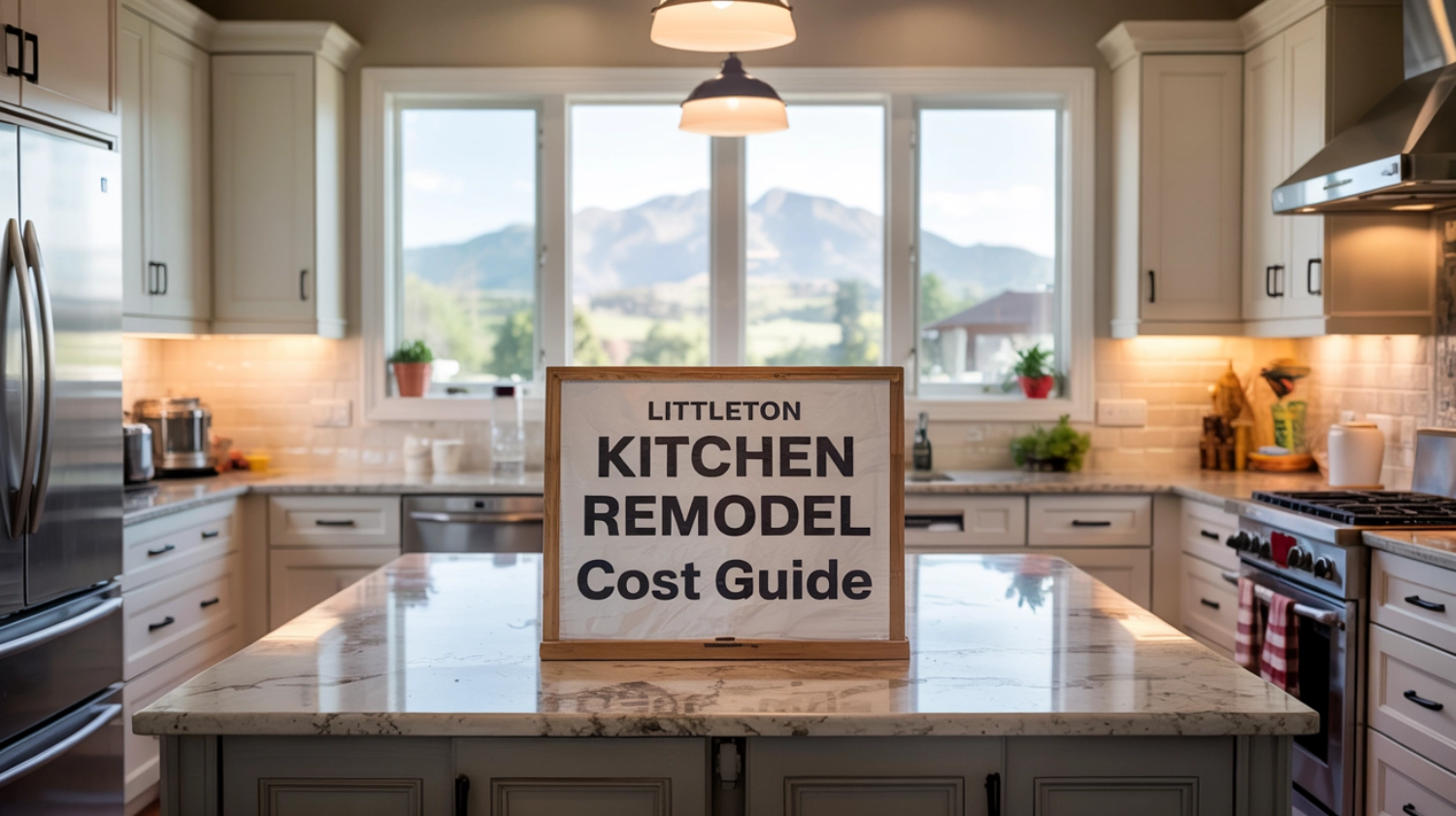
Let’s talk numbers. While cost per square foot gives you a starting point, the total project investment often tells a more reliable story—especially for those mid-range and high-end transformations that make your neighbors jealous.
Cost per Square Foot Ranges
For a basic kitchen refresh in Littleton, you’re looking at approximately $190 to $500 per square foot. Quite a range, right?
At the lower end (based on Denver data), you’re mostly giving your existing kitchen a facelift—repainting cabinets, swapping laminate countertops, and rolling out some vinyl flooring.
Interestingly, Littleton-specific estimates suggest starting prices closer to $400-$500 per square foot for general kitchen remodels. Why the difference? It likely reflects local labor rates, material preferences, or simply what Littleton contractors consider “basic.” This gap highlights exactly why getting local quotes matters for accurate budgeting.
Mid-range kitchen remodels introduce better materials and some layout tweaks. Denver-based estimates put these projects between $11,000 and $25,000 total.
But here’s where it gets interesting: if you apply the per-square-foot range to a medium kitchen (100-200 sq. ft.), your budget balloons to $19,000-$75,000. That massive spread shows just how much your specific design choices impact your final bill.
Ready to go high-end in Littleton? Open your wallet wide. Premium kitchen transformations start around $55,000, with many projects sailing past $150,000. These showcase renovations feature top-tier materials, custom designs, and often knocking down walls to create your dream space.
Average Total Cost by Project Scope
Kitchen remodels typically fall into three categories, each with its own price tag.
A minor remodel includes practical upgrades like cabinet refacing or installing entry-level cabinets, switching to energy-efficient appliances, replacing countertops and fixtures, installing new flooring, and freshening up wall colors. For this level of work, expect to invest around $24,000, with Mountain Region data suggesting a range between $22,500 and $27,500.
What about a major kitchen remodel? Now we’re talking semi-custom cabinetry, kitchen islands, spacious new countertops, upgraded appliances with all the bells and whistles, custom lighting, fresh flooring, and paint. The average runs about $69,000.
And for those dream kitchens you see in magazines? An upscale kitchen remodel pulls out all the stops—custom cabinetry with built-in accessories, stunning stone countertops with tile backsplashes, high-tech appliances, designer fixtures, water filtration, spectacular lighting, premium flooring, and freshly painted walls. This level of luxury averages around $136,000 or more.
Think of it like this: your kitchen remodel budget depends largely on whether you want a reliable sedan, a luxury SUV, or a custom sports car. All will get you where you need to go—but the driving experience differs dramatically.
Return on Investment (ROI) Analysis
Wondering if your kitchen remodel is money down the drain or a smart financial move? Let’s crunch the numbers on what you might get back when it’s time to sell.
The return on your kitchen investment varies dramatically depending on how much you put in and what you do with it.
ROI for Minor Kitchen Remodels
Here’s a pleasant surprise for budget-conscious homeowners: minor kitchen remodels in the Denver metro area (which includes Littleton) deliver an impressive 97.4% return on investment.
What does that mean in plain English? You’ll recoup almost every dollar you spend when you sell. That’s significantly better than the national average and highlights how much Denver-area buyers value even modest kitchen updates.
Data from the broader Mountain Region is a bit more conservative but still impressive, suggesting you’ll recover between 72% and 79% of your costs. Another source pegs the expected return at around 52%.
While these figures vary, the takeaway is clear: modest kitchen updates represent one of the smartest financial moves you can make if you’re looking to enhance your home’s marketability without emptying your savings account.
ROI for Midrange Kitchen Remodels
Step up to a midrange kitchen remodel in Denver, and you’re looking at an average ROI of around 74.8%. These projects typically involve complete cabinet replacements, new flooring, and installation of durable, mid-tier materials.
Mountain Region data suggests a slightly lower return, with cost recoup rates between 54% and 58% for major midrange kitchen remodels.
The message? While you might not get every penny back, you’ll recover a substantial portion of your investment at resale—plus enjoy the benefits of a significantly improved kitchen while you’re still living there. That’s what financial types call a “quality of life dividend.”
ROI for Luxury Kitchen Remodels
Here’s where things get interesting. Luxury kitchen remodels may add the most absolute dollar value to your home, but they typically return a lower percentage of your investment.
In Denver, high-end kitchen transformations yield an average ROI of just 38%. Similarly, Mountain Region data indicates a cost recoup rate around 51% for major upscale kitchen remodels.
Why so low? Premium materials, custom designs, and high-end appliances come with significant upfront costs that aren’t fully reflected in most housing markets.
That said, these renovations can still make financial sense in the luxury market, potentially accelerating your home sale and attracting buyers who prioritize high-end finishes and cutting-edge amenities. Think of it as the cost of playing in the luxury real estate league.
Key Elements to Maximize ROI
Want the biggest bang for your remodeling buck? Focus on these smart upgrades:
Refacing or painting existing cabinets delivers dramatic visual impact at a fraction of replacement costs.
Updating countertops with stylish yet affordable options like quartz or laminate gives you good returns without breaking the bank.
Replacing an outdated backsplash is relatively simple yet significantly enhances your kitchen’s appeal.
Upgrading to energy-efficient, stainless steel appliances appeals to both eco-conscious buyers and those seeking modern convenience.
Even small changes to cabinet hardware, faucets, and lighting fixtures can transform your kitchen’s look and feel for minimal investment.
And while granite or quartz countertops cost more than laminate, they’re often seen as must-have features by potential buyers.
Sometimes it’s the little things that count most—like replacing worn knobs, pulls, and hinges—offering surprisingly high returns for minimal outlay.
Remember this kitchen renovation truth: not all upgrades are created equal when it comes to ROI.
Material Cost Breakdown
Let’s peek behind the curtain at what actually drives your kitchen remodel budget. Material costs make up a huge chunk of your investment, so understanding typical price ranges will help you plan more effectively.
pie showData
title "Kitchen Remodel Material Cost Breakdown (Mid-Range)"
"Cabinetry" : 40
"Countertops" : 15
"Appliances" : 20
"Flooring" : 10
"Plumbing Fixtures" : 5
"Lighting" : 5
"Backsplash & Other" : 5Cabinetry Costs
Cabinets aren’t just storage—they’re the face of your kitchen. And that face can range from budget-friendly to jaw-droppingly expensive.
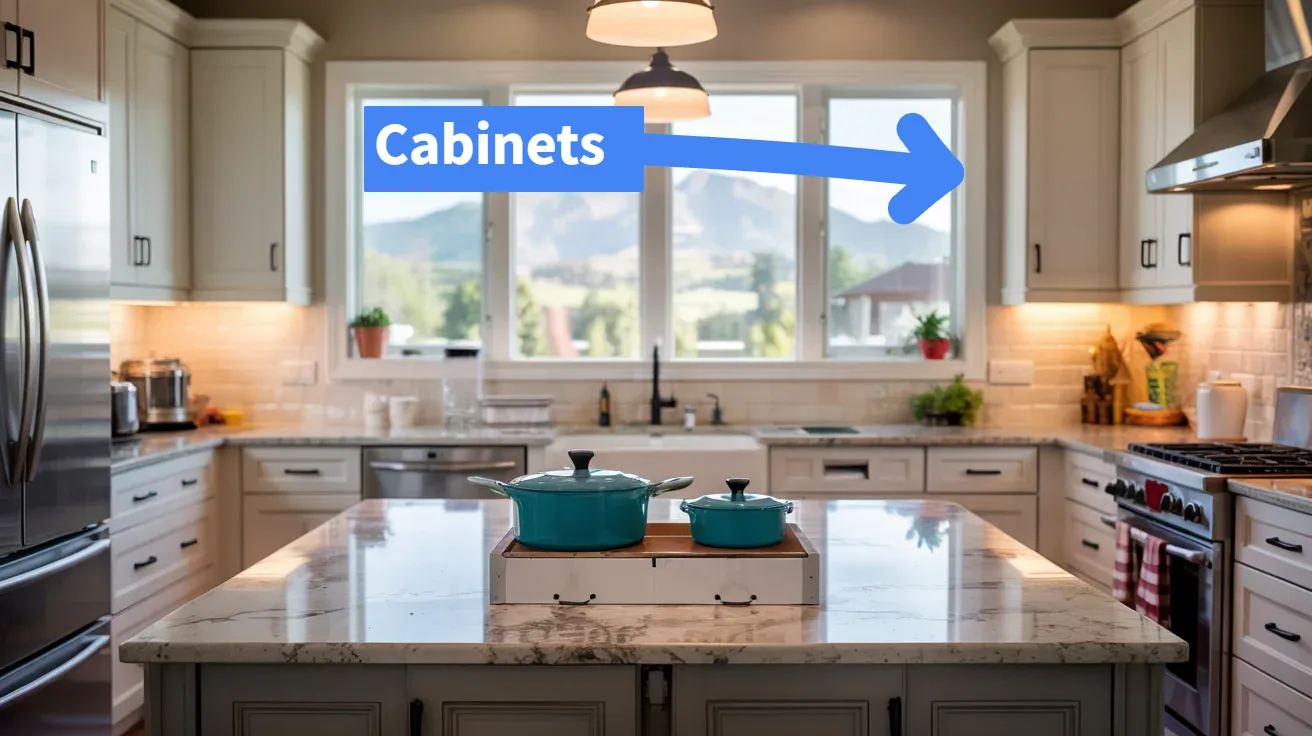
Expect to invest between $5,000 and $25,000 for cabinetry alone. Why such a wide range? It all comes down to materials and craftsmanship.
At the lower end, you’ll find cabinets made from particleboard. Mid-range options typically feature plywood construction, while premium selections showcase solid wood throughout. The complexity of your design and quality of craftsmanship also play major roles in the final price tag.
Custom and semi-custom cabinets add the most value to your home, though refacing existing cabinets offers a more wallet-friendly approach if your current layout works well.
Littleton retailers offer cabinets for every budget, with individual units ranging from under $100 to over $1,500 depending on size, materials, and features. For perspective, in the broader Denver area (which includes Littleton), kitchen remodels typically run $20,000 to $65,000, with cabinetry consuming a substantial slice of that pie.
Countertop Costs
Your countertop choice significantly impacts both your budget and your kitchen’s overall aesthetic. Home Depot provides a helpful breakdown of average material costs per square foot:
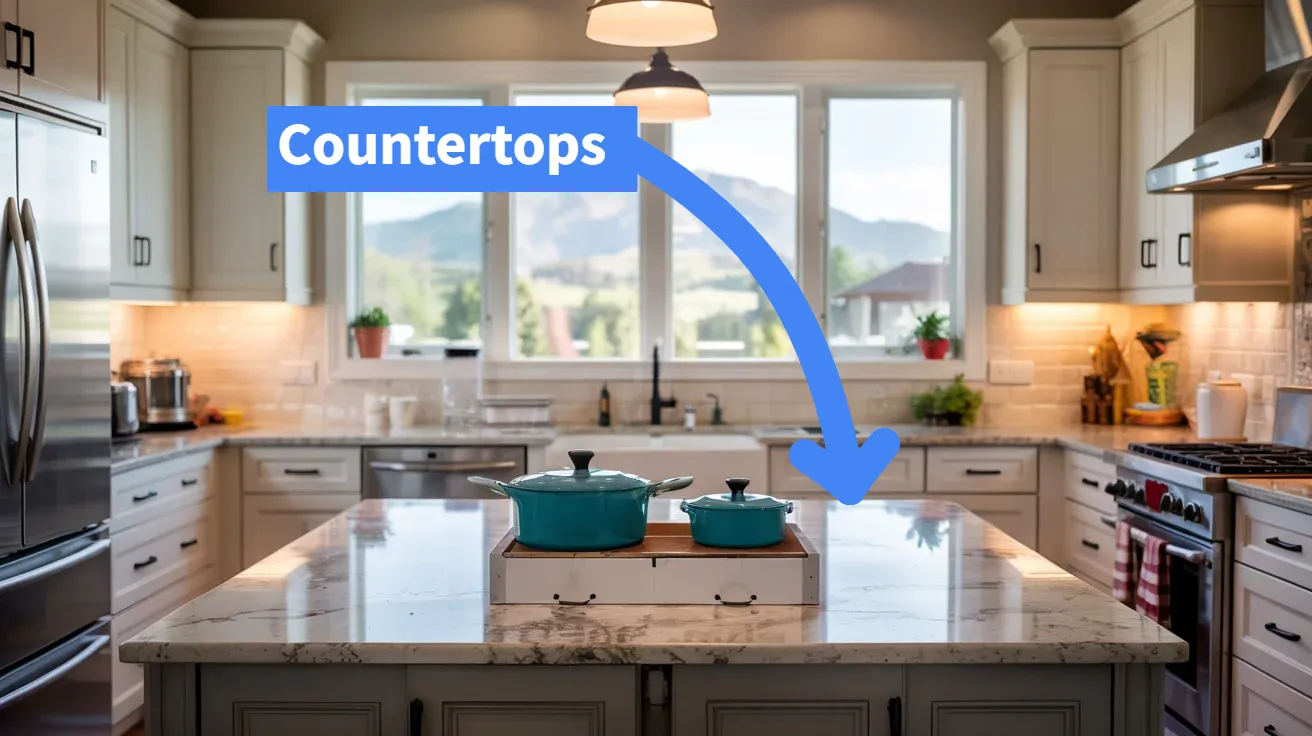
- Quartz: $59-$130
- Granite: $43-$140
- Natural stone: $57-$170
- Solid surface: $35-$100
- Laminate: $19-$45
- Ultra-durable materials: $69-$120
In Littleton specifically, stone and granite countertop installation averages around $3,153, typically ranging from $2,007 to $4,395. Final costs depend on the specific stone type, installation complexity, and customizations like edge treatments.
Granite and quartz remain popular choices for mid-range remodels, offering that sweet spot between durability, beauty, and budget. They’re the kitchen equivalent of investing in a quality mattress—something you use daily and want to last for years.
Flooring Costs
Your kitchen floor takes a beating from foot traffic, spills, and dropped utensils. Choosing the right material balances durability with your design vision.
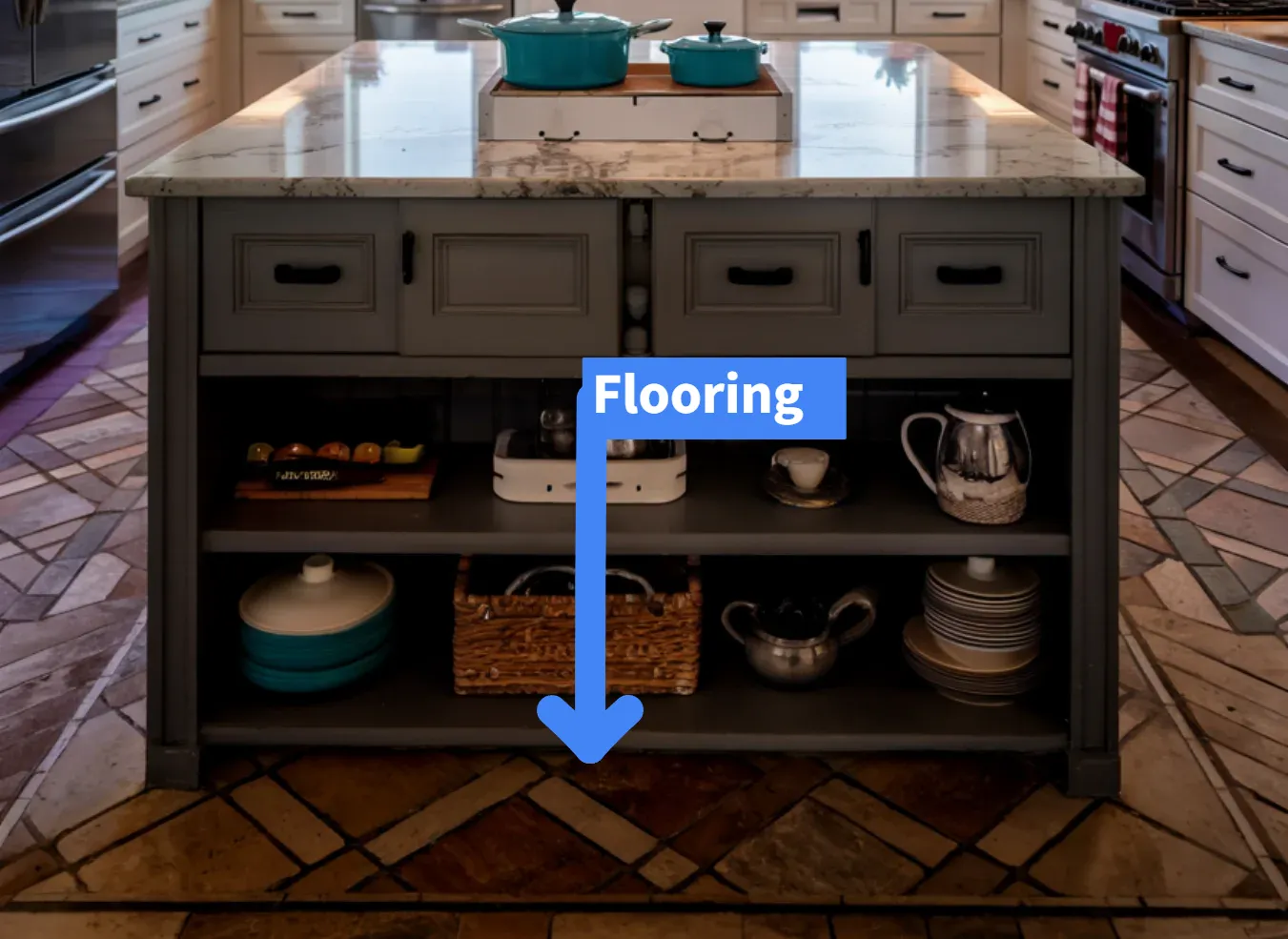
Expect to invest between $1,000 and $8,000 for materials and installation. Breaking this down by square foot (including installation), you’re looking at:
- Vinyl: $4-$5.50
- Cork: $6-$8.50
- Laminate: $6-$13
- Hardwood: $7.50-$24.50
- Ceramic or porcelain tile: $11-$29
- Slate or natural stone: $14.50-$27.50
Local retailers offer plenty of options, and most provide installation services as well.
When selecting flooring, consider more than just price. How will it hold up to water spills? Can it withstand a dropped cast iron pan? Will it still look good in five years? Sometimes paying more upfront saves money (and headaches) down the road.
Appliance Costs
Upgrading kitchen appliances is another significant investment, typically ranging from $2,000 to $10,000 depending on brands, features, and energy efficiency ratings.
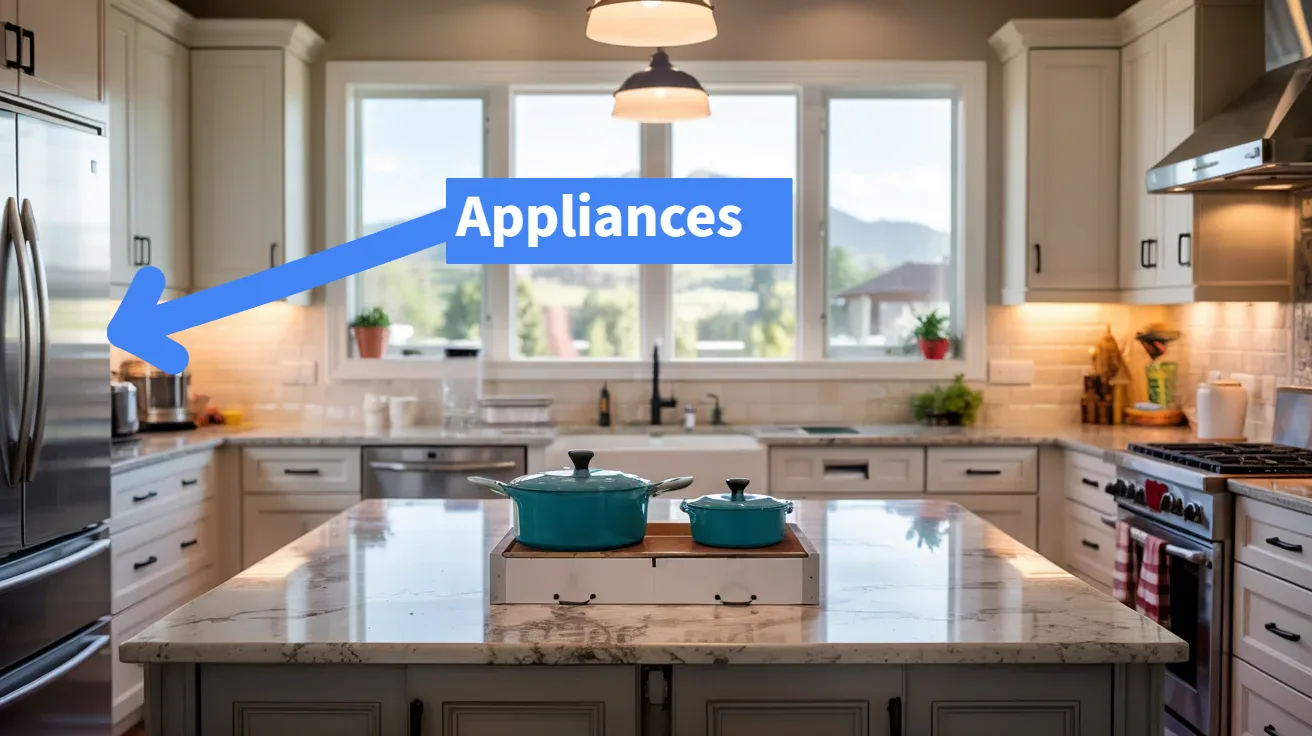
Retailers in Littleton offer everything from basic package deals starting around $3,000 to premium brand collections exceeding $37,000 for the serious home chef. Remember to factor in potential installation costs, which might include electrical or plumbing work depending on what you’re replacing.
Other Material Considerations
Beyond the big-ticket items, don’t forget the finishing touches: paint, lighting fixtures, and backsplash tiles. While individually less expensive, these elements collectively impact your budget and dramatically affect your kitchen’s final appearance.
Paint typically comes standard in minor remodels, while custom lighting often features in major renovations. These seemingly small details tie your kitchen together visually and shouldn’t be afterthoughts in your planning.
Remember, your materials aren’t just about aesthetics—they determine how your kitchen functions and how much maintenance you’ll face for years to come.
Permitting Requirements and Associated Costs in Littleton
The least exciting part of your kitchen remodel might be the most important: getting proper permits. Skip this step, and you might face fines, forced demolition, or problems when selling your home. Let’s walk through what Littleton requires.
When is a Permit Required?
Wondering if your dream kitchen needs official approval? Here’s the quick version: if you’re changing structure, electrical, or plumbing, you probably need a permit.
This includes moving or removing walls, altering electrical wiring or outlets, and relocating plumbing fixtures. Even in neighboring Columbine Valley, kitchen remodels typically require official paperwork.
The good news? Purely cosmetic changes—like painting or installing new floor coverings without altering what’s underneath—generally don’t require permits. When in doubt, contact Littleton’s Building Department directly. Better to ask questions upfront than face problems later.
Permitting Process
Navigating Littleton’s permitting process involves several steps, but it’s more straightforward than you might fear.
First, determine if your specific project needs a permit. If yes, gather all required documentation—typically detailed plans, drawings, and specifications that show exactly what you’re planning to do.
Next, submit your application, documentation, and fees to Littleton’s Building Department. The city encourages using their eTRAKiT online system, allowing electronic submission and payment—no need to take time off work for an in-person visit.
After submission comes the review process, which can take several weeks depending on your project’s complexity. Once approved, you’ll receive your permit and can begin work.
But you’re not done yet! You’ll need scheduled inspections at various stages of the project, culminating in a final inspection to ensure everything meets code requirements. Think of these inspections as quality control checkpoints rather than bureaucratic hurdles.
Questions about the process? Littleton’s Permit Center can be reached at 303-795-3751 or [email protected].
Permit Fee Schedule
How much will permits set you back? Littleton bases permit fees on your project’s total valuation.
As of January 2025, here’s what you’re looking at:
For projects valued between $25,000.01 and $50,000, expect to pay $430.37 for the first $25,000 plus $11.11 for each additional $1,000 or fraction thereof.
If your project falls between $50,000.01 and $100,000, you’ll pay $708.12 for the first $50,000 plus $7.70 for each additional $1,000.
Beyond the base permit fee, you’ll also pay:
- A Use Tax Deposit (0.01969 × total job valuation)
- An Arapahoe County Open Space Tax (0.00125 × total valuation)
- A Plan Review Fee (65% of the permit fee) if blueprints need code compliance review
Other potential costs include hourly inspection charges ($80 per hour during normal business hours, with overtime rates) and re-inspection fees ($80 per hour if issues need correction).
City of Littleton Building Permit Fees (2026)
| Total Valuation | 2026 Fees |
|---|---|
| $1 – $500.00 | $25.85 |
| $500.01 – $2,000.00 | $25.85 for the first $500 plus $3.35 for each additional $100 or fraction thereof |
| $2,000.01 – $25,000.00 | $76.17 for the first $2,000 plus $15.40 for each additional $1,000 or fraction thereof |
| $25,000.01 – $50,000.00 | $430.37 for the first $25,000 plus $11.11 for each additional $1,000 or fraction thereof |
| $50,000.01 – $100,000.00 | $708.12 for the first $50,000 plus $7.70 for each additional $1,000 or fraction thereof |
| $100,000.01 – $500,000.00 | $1,093.12 for the first $100,000 plus $6.16 for each additional $1,000 or fraction thereof |
| $500,000.01 – $1,000,000.00 | $3,557.12 for the first $500,000 plus $5.23 for each additional $1,000 or fraction thereof |
| Greater than $1,000,000.00 | $6,172.12 for the first $1,000,000 plus $4.02 for each additional $1,000 or fraction thereof |
Other Applicable Taxes and Fees:
- USE TAX DEPOSIT: 0.01969 × TOTAL JOB VALUATION
- ARAPAHOE COUNTY OPEN SPACE TAX: 0.00125 × TOTAL VALUATION
- PLAN REVIEW FEE: 65% × PERMIT FEE(S) (if applicable)
- Inspection normal business hours: $80 per hour
- Inspection outside normal business hours: $80 per hour after two hours (minimum charge of $160 paid in advance)
- Re-inspection fees: $80 per hour
While permitting adds time and expense to your remodel, it ensures safety standards are met—protecting both your family and your investment.
Impact of Design and Project Complexity on Costs
Not all kitchen remodels are created equal. Your design choices and project complexity dramatically influence your final bill. Let’s look at what drives costs beyond just materials and square footage.
Layout Modifications
Dreaming of an open-concept kitchen? That dream comes with a price tag.
Removing walls represents one of the biggest potential cost variables in your remodel. Non-load-bearing walls might set you back just a few hundred dollars. But knock out a load-bearing wall, and you’re looking at several thousand dollars for the necessary structural support.
Moving appliances and fixtures isn’t just about sliding them to new locations. Each move potentially involves rerouting utilities behind the scenes. Relocating a gas line? That’ll be $270 to $880. Upgrading from an electric to a gas range? Plan for $130 to $2,000, depending on your home’s current setup.
Even your basic kitchen configuration matters. Whether you choose galley, L-shaped, U-shaped, or island layouts affects material quantities and labor requirements. It’s like the difference between a straight haircut and a complex style—the same raw materials, but very different amounts of skill and time.
The simplest (and most budget-friendly) approach? Replace outdated elements while maintaining your existing layout. Every change to your kitchen’s footprint ripples through your budget.
Plumbing and Electrical Work
Behind those beautiful fixtures and gleaming appliances lies the invisible infrastructure that makes everything function. This hidden work can represent 20% to 35% of your total budget.
The national average for plumbing work in a kitchen remodel ranges from $4,000 to $7,000, varying with how many fixtures you’re adding or relocating. In Littleton specifically, new construction plumbing costs between $654 and $2,235 on average.
What about electrical updates? Adding outlets, installing under-cabinet lighting, or upgrading your electrical panel to handle new appliances all add to your bottom line. Expect to pay between $2,000 and $5,000 for electrical work, with Colorado electricians typically charging $50 to $100 hourly.
These systems form your kitchen’s nervous and circulatory systems—invisible but essential. Cutting corners here to save money often leads to bigger expenses down the road.
Custom Features and Finishes
Want a truly one-of-a-kind kitchen? Custom features and high-end finishes can dramatically elevate both your space and your budget.
Custom-designed cabinetry costs significantly more than stock or semi-custom options, but offers perfect fits and unique designs impossible with off-the-shelf products. Think of it as the difference between a tailored suit and one off the rack.
Elaborate trim work, designer lighting fixtures, and countertops crafted from premium natural stones like exotic granite or marble varieties all contribute to a higher overall investment.
While these luxury choices create a stunning, personalized space, be realistic about their impact on your budget. Sometimes a judicious mix of high-end focal points with more modest supporting elements creates the most impressive result for your investment.
Remember: complexity compounds costs. Each custom feature adds design time, specialized labor, and often longer lead times to your project.
Labor Costs for Kitchen Remodeling
When budgeting for your kitchen remodel, materials often steal the spotlight. But what about the skilled hands that transform those materials into your dream kitchen? Labor costs represent a substantial chunk of your total investment.
General Contractor Rates
In Littleton, residential remodeling professionals earn an average of $27.45 hourly, typically ranging between $22.50 and $32.84. However, when you hire a general contractor to oversee your entire project, rates can jump to $50-$150 per hour.
Why the difference? General contractors don’t just swing hammers—they coordinate the entire project, from scheduling specialized trades to ensuring materials arrive on time.
The total labor cost, including your general contractor and all specialized trades, typically accounts for 20% to 35% of your entire remodel budget. That’s a significant slice of the pie, but skilled labor is what transforms good materials into a great kitchen.
Want to make sure you’re not overpaying? Get multiple estimates from different contractors to understand the prevailing rates and what’s included in each quote. The cheapest bid isn’t always the best deal if it leaves out crucial services or quality guarantees.
Specialized Trade Rates (Plumbers, Electricians)
Your kitchen remodel likely requires specialized professionals beyond general carpentry—particularly plumbers and electricians.
Plumbers in Colorado earn approximately $31.96 hourly on average, with most falling between $25.00 and $36.63. However, Littleton plumbers might command higher rates than the state average.
What about the people who power your kitchen? Electrician apprentices in Littleton average around $22.85 hourly (ranging from $18.32 to $25.29), while experienced electricians typically earn closer to $30.52 per hour.
These rates vary based on experience, licensing, and job complexity. Rewiring an entire kitchen costs more than adding a single outlet—just as replacing all plumbing demands more expertise than hooking up a dishwasher.
Labor Cost as a Percentage of Total Budget
Industry data shows labor and installation typically consume about 30% to 35% of your total kitchen remodel budget, with materials and appliances taking the remainder.
Some estimates place labor costs as low as 17% or as high as 35% of the total project. Why such variation? It depends largely on your project’s scope and material selections.
High-end materials generally require more skilled installation, driving labor costs higher in percentage terms. Conversely, if you’re splurging on luxury appliances but keeping installation straightforward, labor might represent a smaller percentage of your total.
Think of labor costs not just as an expense but as an investment in proper execution. The finest materials poorly installed still result in a disappointing kitchen. Quality craftsmanship, on the other hand, can elevate even modest materials into something special.
Material Availability and Local Pricing Considerations
Wondering where to shop for your kitchen transformation in Littleton? Good news: you’ve got options. From big-box stores to specialty shops, Littleton offers access to virtually any material you might desire for your remodel.
General Availability of Common Materials
Major home improvement giants like Lowe’s and Home Depot have locations in and around Littleton, providing one-stop shopping for cabinets, countertops, flooring, and appliances. These retailers offer considerable selection across various price points, making them convenient starting points for many homeowners.
Beyond the big boxes, Littleton boasts specialty stores that cater to more specific needs. Places like Mountain High Appliance focus exclusively on kitchen appliances, while Carpet Mill Outlet Stores specialize in flooring options.
This diversity of retailers ensures you’ll find materials matching both your design vision and budget constraints. Whether you’re seeking the latest smart appliances or trying to match historical cabinet styles, Littleton’s retail landscape has you covered.
Pricing Trends in the Littleton Area
While a comprehensive analysis of current material prices would require real-time market research, local contractor estimates and retailer pricing provide useful insights into Littleton’s cost landscape.
Littleton-based kitchen remodelers suggest starting costs in the $400-$500 per square foot range, indicating material and labor costs trending somewhat higher than in some surrounding areas.
Local retailers showcase wide-ranging prices. Lowe’s, for instance, lists cabinets spanning from budget-friendly to high-end, while Mountain High Appliance offers everything from basic models to professional-grade equipment.
Given Littleton’s proximity to Denver, pricing patterns observed by firms like Colorado Builders Group and VL Builders offer relevant context for your planning. The Denver metro area generally trends near national averages for most materials, though transportation costs can affect certain items.
For the most accurate, up-to-date pricing relevant to your specific project, nothing beats getting detailed quotes from local suppliers and contractors. Prices for identical materials can vary significantly between retailers, and contractor discounts might give you access to better rates than direct retail purchasing in some cases.
Remember that availability can fluctuate seasonally, and special orders may require longer lead times—factors worth considering when planning your renovation timeline.
Typical Project Timelines
“How long will this kitchen remodel take?” might be the second most important question after “How much will it cost?” The answer depends largely on your project’s scope and complexity.
gantt
title Kitchen Remodel Timeline Comparison
dateFormat X
axisFormat %d
section Basic Remodel
Planning & Design :a1, 0, 7d
Permits :a2, after a1, 7d
Demolition :a3, after a2, 3d
Rough-in Work :a4, after a3, 5d
Cabinets & Counters :a5, after a4, 5d
Finishing Touches :a6, after a5, 5d
Final Inspection :a7, after a6, 1d
section Custom Renovation
Design Development :b1, 0, 14d
Material Selection :b2, after b1, 14d
Permits :b3, after b2, 14d
Demolition :b4, after b3, 5d
Structural Changes :b5, after b4, 10d
Rough-in Work :b6, after b5, 14d
Custom Cabinets :b7, after b6, 21d
Countertops :b8, after b7, 7d
Backsplash & Flooring:b9, after b8, 7d
Finishing Work :b10, after b9, 10d
Final Inspection :b11, after b10, 2dHere’s what to expect in terms of timeline—and why patience often pays off in kitchen renovation.
Timeline for Basic Kitchen Replacements
Planning a simpler kitchen refresh that keeps the existing layout while updating components? You’re looking at a relatively quick turnaround.
Most basic kitchen remodels in Littleton wrap up in approximately 3 to 8 weeks from demolition to final touches. The shorter end of this range (3-4 weeks) applies to straightforward projects with readily available materials and minimal complications.
The longer timeframe (6-8 weeks) typically accounts for potential material delays or minor unexpected issues that crop up once work begins. These projects move faster because they don’t involve significant changes to your kitchen’s plumbing, electrical, or structural elements—the real time-consumers in any renovation.
Think of these projects as kitchen refreshes rather than complete transformations. You’re updating the look and function while respecting the existing bones of the space.
Timeline for Custom Kitchen Renovations
Dreaming bigger with a complete kitchen transformation? Your timeline stretches accordingly.
For complex kitchen renovations featuring custom designs and significant layout changes, the construction phase alone typically runs 8 to 12 weeks. But here’s what many homeowners don’t initially realize: the entire process often extends much longer.
When you factor in initial design work and material selection, your timeline can easily extend to two months or longer. Custom cabinets, specialty countertops, and high-end appliances often have lead times of several weeks—and you can’t install them until the space is prepared.
Full-scale remodels involving structural changes and custom features sometimes require 3 to 6 months from concept to completion. The planning phase alone might consume 2 to 3 months as designs are refined and materials selected.
Is this extended timeline worth it? Most homeowners who’ve completed major remodels would say absolutely. The extra time allows for thoughtful decisions rather than rushed compromises.
Clear communication with your contractor proves essential for managing expectations and minimizing delays. Experienced contractors build buffer time into their estimates, knowing that unexpected issues almost always arise once walls and floors are opened up.
Remember this renovation truth: quality kitchen remodels are rarely quick, but quick kitchen remodels are rarely quality. The difference between “done” and “done right” often comes down to allowing appropriate time for each phase of the process.
Conclusion
Kitchen remodeling in Littleton isn’t just about beautiful spaces—it’s about calculated investments.
From modest refreshes under $10,000 to magazine-worthy transformations exceeding $150,000, your renovation budget directly impacts both daily enjoyment and eventual returns. Interestingly, minor updates deliver the highest percentage ROI when selling, though midrange renovations often hit the sweet spot between immediate pleasure and future value.
Your material selections drive these costs. Cabinets, countertops, flooring, and appliances each offer opportunities to splurge where it matters most while saving elsewhere. And don’t underestimate design complexity—each wall moved ripples through your timeline and budget.
The paperwork matters too. Littleton’s permitting process protects both your safety and investment, with fees scaling based on project value.
The recipe for renovation satisfaction? Detailed planning, realistic budgeting, and transparent contractor communication. These ingredients, more than any specific design choice, determine whether your kitchen remodel leaves you with a lasting smile—and a space that works as beautifully as it looks.
FAQ
How much does it cost to remodel a kitchen in Colorado?
The average cost to remodel a kitchen in Colorado ranges from $25,000 to $50,000. Mid-range renovations typically cost $50,000 to $75,000, while high-end upgrades can exceed $100,000. Labor and material choices heavily influence the final price.
What is a reasonable budget for a kitchen remodel?
A reasonable budget for a kitchen remodel is $25,000 to $50,000 for mid-range updates. Cosmetic changes can cost $10,000 to $20,000, while luxury renovations often exceed $75,000. Costs should align with project goals and home value.
Is $10,000 enough for a kitchen remodel?
$10,000 is enough for minor updates like painting, hardware replacement, or affordable appliances. It typically cannot cover structural changes or high-end materials. Focus on cosmetic improvements within this budget.
How much should a 12×12 kitchen remodel cost?
A 12×12 kitchen remodel costs between $15,000 and $45,000 depending on materials and labor. Basic updates average $15,000 to $25,000, while premium upgrades can reach $40,000 or more. Location and contractor rates also affect pricing.

